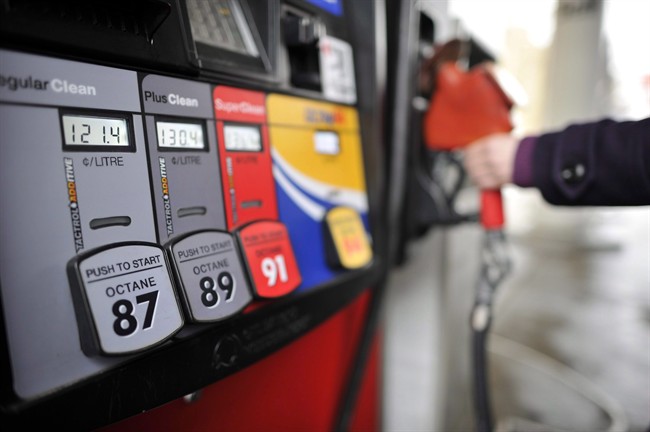No, you’re not imagining things: In many parts of Canada prices at the gas pump tend to spike as long weekends draw near.

There are multiple factors at play, said Dan McTeague, senior petroleum analyst at GasBuddy.com, a big one being retailers running razor-thin margins seizing the opportunity to push up prices.
READ MORE: Why this may be the best summer ever to spend your vacation in Canada
“More often than not the prices only go up because of the retail shenanigans,” said McTeague.
“We’re talking about the retail margin, and that’s the only thing that goes up and down like an escalator.”
Many gas retailers have an operating margin of between seven to 12 cents per litre, said McTeague. Throughout the year they are selling their gas with next to no markup to stay competitive — that is, until road trip season arrives.
“It’s retailers playing yo-yo with their 10 cent operating margin — that’s the only thing that moves up on the long weekends, generally speaking,” said McTeague.
WATCH: Consumers frustrated with fluctuating gas prices

The market gas price does fluctuate and is determined by multiple factors, which according to CAA including state of world reserves and production, limited refining capacity, and geopolitical tensions.
Factors beyond retail margins can’t be ignored, said Kristine D’Arbelles senior manager of public affairs for CAA National.
“Prices tend to go up before the long weekend and right before the summer but not necessarily because gas companies want to make more money,” said D’Arbelles.
“Supply and demand is obviously one aspect of it but the more expensive aspect, the reason why prices really go up is because refineries have to shut down to switch to a cleaner burning gasoline.”
Gasoline sold during the warmer months is different that what’s at the pumps in the winter. The formulation changes to stabilize gasoline from expanding and evaporating as temperatures rise, said McTeague.
Not only is it a more expensive product, the shift from producing winter-grade fuel to summer-grade fuel hikes prices for consumers.
READ MORE: How much do you spend on tax at the pump?
Refineries need to slow production or totally shut down, recalibrate, and get up and running again. Amid the turnover supply is decreased, while consumer demand stays the same or goes up, and so prices rise.
- Life in the forest: How Stanley Park’s longest resident survived a changing landscape
- Bird flu risk to humans an ‘enormous concern,’ WHO says. Here’s what to know
- Roll Up To Win? Tim Hortons says $55K boat win email was ‘human error’
- Election interference worse than government admits, rights coalition says
“That’s why you always see a hike before the long weekend — two things are happening at the same time,” said D’Arbelles. “Refineries are shutting down, getting ready for their maintenance and cleaning up, but then you also just have the regular supply and demand.”
McTeague argues, however, that the refinery changeover process is already well behind us for the season.
A rise in gas prices can make a big impact on household budgets, Jeffrey Schwartz, executive director for Consolidated Credit Counseling Services of Canada, told Global News last month.
READ MORE: Canadian families could spend $1,600 more this year as grocery, gas bills rise
“As the busy spring and summer road trip season approaches, drivers should expect to see more increases at the pump as gas will be in high demand,” said Schwartz.
“As gas prices continue to rise, it will affect many families greatly. The extra $10 or $20 or more they spend on gas on a weekly basis could mean the less they have to spend on other household expenses.”
There are ways you can use less fuel and delay your trips to the pump.
- Ease off the gas: Driving with a light foot and easing off the gas can increase your fuel mileage;
- Firm tires: When you drive on soft tires, your vehicle will burn more fuel, as low pressure increases rolling resistance;
- Don’t idle: You’re waste expensive fuel while contributing to air pollution;
- Lighten your load: An easy way to improve your vehicle’s fuel efficiency is to make the car as light as possible;
- Consider your bike: Ditch your car for your bike or public transportation – a healthier and cheaper option.
— With files from Global News reporters Katie Dangerfield and Rachel Lau




Comments